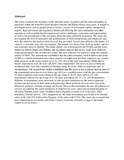| dc.description.abstract | The study examined the dynamics of the informal sector in general and the salon enterprises in particular within the Nairobi Central Business District and Kibera Slums study areas. It sought to investigate issues such as gender parity/concerns, sources of investment capital, management aspects, legal provisions and regulatory framework affecting the salon enterprises and other regulations such as public health requirements and its challenges, constraints and opportunities as well as the perceptions of the customers about the salon enterprise in general. The study also investigated the level of education and qualifications of both entrepreneurs and employees and how this related to the kind of salon services they provided. Factors that influence the choice of a salon by a customer were also investigated.
The sample was drawn from both up market and low end consumer areas in Nairobi. The upper market was represented by the NCBD_and the lower market by Kibera Slums area Primary and secondary data for this survey study were collected using questionnaires and an interview guide. The data collected was analyzed using the students' edition of SPSS. The research has established that the salon enterprise, both in Kibera and in the NCBD is a female dominated area where majority of employees and their employers are women. Male presence in the sector turned out to be 15% (36) of the total respondents. While that of female respondents took the lead with 82% (166) respondents.
The sector is also a Christians dominated field with only a handful of Muslims being involved, either as employees and or entrepreneurs. The research has further established that the sector is not a retirees field as most of the respondents interviewed were below age 40. It is a youthful sector with the age concentration of salon employees and owners being in the age range of 20-30 years with 62.2% (56) respondents followed by age range of 31-40 years accounting for, 31.1 %. (28) Respondents. Majority of respondents were motivated to start up salon businesses by the need to generate income and as a result of their talent in hairdressing. Most preferred services were seen to be Manicure, pedicure, relaxing massage and Facial.
Factors that determines the mix and patterns of services provided by the salon enterprises in Nairobi City were varied and included Hygiene of the salon; Friendly salon staffs; Qualified staffs; Hygiene of staffs; Cost of services; salon proximity; Friends' advise; . New equipment etc. the main determinant was found to be friendly salon staffs with 55% followed by Hygiene of the salon with 52.5%. The study also revealed that most entrepreneurs use family and friend's source of income, personal savings as the initial capital to set up salons. | en_US |

